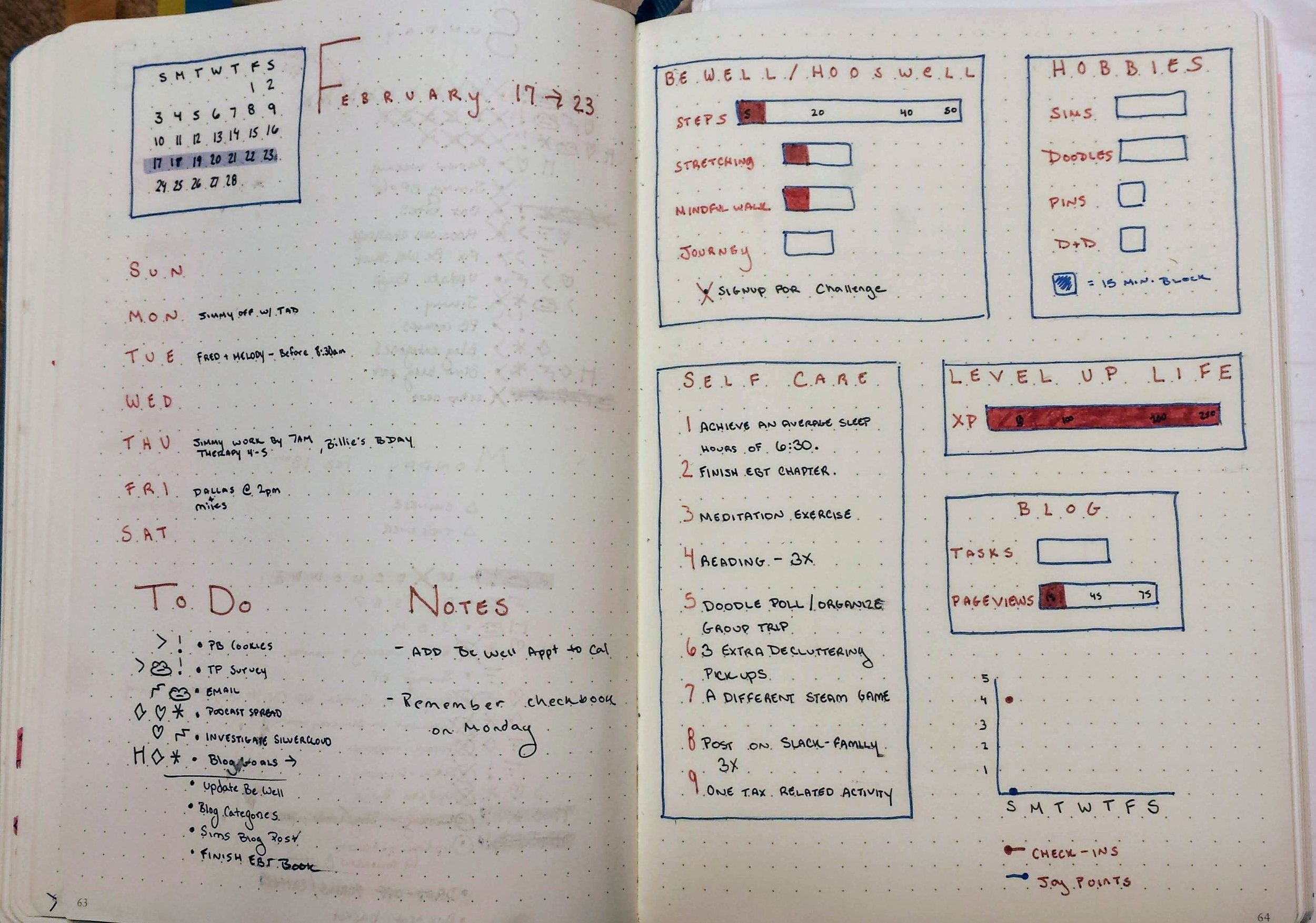Types of Self Care: A Comprehensive Look at Self Care
/I’ve become increasingly interested in self-care recently. I want to feel happier and healthier, and proper self-care seems to be the best path forward for that journey. I want to create some weekly self-care goals in my bullet journal. While I could write a long list of all the different activities that would be good self-care for me, I wanted to make sure I was considering all my options. Were there self-care activities that I wasn’t thinking of that would be beneficial for me?
As always, I did my research! What I found was that self-care touches on all aspects of life and that I probably would not have considered all these areas. Or if I did, I wouldn’t have had a balance between them.
I started with the simplest question- What is self-care? According to Merriam-Webster, it is “care of oneself.” Um...I could’ve guessed that much, thanks. I think you pretty much used the word in the definition there, and a teacher would have taken points off, Merriam. Google told me “the practice of taking an active role in protecting one's own well-being and happiness, in particular during periods of stress” or “the practice of taking action to preserve or improve one's own health”. Now there is a proper definition, thank you!
Those definitions cover a pretty broad area. We need to consider our own health, happiness, and well-being. Even on their own, those three areas (health, happiness, and well-being) are complicated with a bunch of factors contributing to them. What factors should we look at? Here’s where the self-care categories come into play. I consulted six websites and found a lot of overlapping information, but with some variety too. I’ve consolidated the information I found into the following list and added my own examples. You can explore my sources in the links at the bottom if you’d like a second (or third, or fourth) take on this information.
Update: I did a post dedicated to the question of “what is self-care?”, you can check it out here: https://www.crazycatnerd.com/blog/the-basics-of-self-care
Types of Self Care
1) Physical- Physical self-care is one of the more obvious categories. It is likely when you think of “self-care” at least one of the first things you think of will be in this category. This is the care of our physical bodies. This can include things like: exercise, nutrition, hydration, sleep, skincare, beauty, stretching, rest, medical and dental appointments, medicine, and pain management. If you’d like to improve your physical self-care try setting a goal like one of these:
Increasing your daily step count
Setting a bedtime
Eating 5+ servings of fruits and vegetables daily
Establishing a skincare routine
Making an appointment to see a doctor about a medical issue that concerns you
2) Emotional or Psychological- This is self-care as it relates to your emotional and mental health. This involves being aware of your emotions- recognizing, honoring, accepting, and feeling them. Activities in this area might include crying, laughing, therapy (including traditional talk, EBT, CBT, and others), self-awareness, journaling, mood tracking, art, self-compassion, meditations, gratitude journaling, mindfulness and being aware of your own triggers. Examples of goals you could set for emotional self-care include:
Making an appointment to see a therapist (you do not have to wait for someone to diagnosis you with something, talking with a therapist on a regular basis is just as important as getting a physical checkup with a PCP)
Read a book or complete a workbook about dealing with emotions
Journal for five minutes every night
Each day identify three things you are grateful for
Find websites or apps that explain meditation, mindfulness, or self-compassion and complete a daily exercise in one of those areas.
3) Spiritual- Spiritual self-care does not necessarily mean religion. Spiritual self-care focuses on providing meaning and purpose and increases your connection to humanity. Some activities might include: donating time or money to important causes or charities, learning about different cultures, religious activities, spending time in nature, meditation, gardening, bonsai, alone time, visiting historical places, and learning about history. Activities that can help your improve your spiritual self-care might include:
Visit a local museum and learn something
Volunteer
Take a walk in nature
Read a book from another religion
Travel to a foreign country
4) Intellectual/Mental- Intellectual self-care is to nourish the mind, to prevent it from getting bored and to keep the brain healthy by learning new things. Some activities might include learning, puzzles, games, reading, hobbies, professional activities, career development, and critical thinking skills. Some examples of things you can do include:
Research ways to improve your critical thinking skills
Play a resource management game such as Settlers of Catan or Two Point Hospital
Listen to a science podcast such as Science Vs.
Read a book about a topic you are interested in
Do a crossword
5) Social- Social self-care involves interacting with other humans in a positive way. Humans are social creatures and, even those of us who are introverted, need to feel connected to other humans. This may include activities in areas such as having meaningful and healthy relationships, support groups, clubs, friend gatherings, setting boundaries, and being intentional about our social interaction. Family relationships are not included in this category. It is important to socialize outside your family. Things you could do to improve social self-care may include:
Making an effort to improve your relationship with coworkers
Writing or calling a friend whom you haven’t been in touch with recently
Arranging a game or movie night
Joining a club or other recreational organization
Arranging a weekend trip with close friends.
6) Environmental/Sensory- Environmental and sensory self-care involves making your surrounding environment comfortable for you. This might involve things having to do with your five senses, climate control, the tidiness of the space around, and the appeal of your local environment. Ways to improve this area might be to:
Light a candle with your favorite fragrance and put on soothing music.
Declutter and clean a shelf in your living room.
Decorate your work area with a plant or favorite picture.
Invest in a good desk chair.
Wash your sheets, change your air filter, and vacuum often if you have allergies.
7) Play/Fun/Joy- An aspect of self-care that you may not consider is having fun! Finding moments of play throughout the day keeps us energized, motivated, and optimistic. We enjoy having fun and we aren’t our best if we aren’t finding enough of it. This includes any activities you truly enjoy- watching a movie, participating in a hobby, watching television, going out with friends, playing games, reading, etc...Here are some ideas of ways you can improve this area of self-care:
Consider your work-life balance. If you feel like you are working too hard and finding no time for fun, reprioritize.
Intentionally watch a tv show. Flipping channels when you are tired of putting something on in the background doesn’t count. Find a show you really enjoy and set time aside to do just that.
Play a board game you’ve never tried before
Add to a collection or organize it
Put “play a video game” on your to-do list
8) Family/relational- This category includes your relationships with those whom you consider family. Family might include your blood relatives, your pets, your spouse, friends you’ve had since you were tiny or friends of the family that you treat like family. It also can include family planning, if you plan to expand your family at some point. Here are some ideas for working on family self-care:
Schedule a family game night.
Call a parental figure you haven’t spoken to in a while.
Create a family photo album
Look into adopting a new pet (even something as small as a fish or rodent)
Using either your DNA or information from your family, start researching your ancestors and genetic connections.
9) Safety & Security- This area of self-care considers your risk of harm from others, preparedness in an emergency situation, and other practical concerns. This might involve insurance, finances, self-defense, risk assessment, gathering resources, and increasing your ability to be independent. In extreme situations, this may involve extricating yourself from an unsafe environment (such as in the case of domestic violence), breaking an addiction, or seeking legal help. Some less extreme examples might include:
If you live with someone, take a moment to consider the possibility of suddenly being on your own. Do you have the means to support yourself? Are there any activities that your partner, roommate, or family member does that you might want to learn how to do? What can you do to prepare from a practical standpoint?
Check to make sure you have smoke detectors in enough places in your home. Do they need new batteries? Should the be replaced? Do you need carbon monoxide detectors?
Take a self-defense course.
Open a savings account.
Review your home and/or auto insurance.
Sources:
https://themighty.com/2017/11/types-of-self-care-for-mental-health/
https://blogs.psychcentral.com/weightless/2011/05/the-7-vital-types-of-self-care/
https://tulipandsage.com/2018/11/08/6-types-of-self-care-ways-to-practice-them/
http://lunanimafox.com/blog/self-care-types
https://www.coffeewithsummer.com/self-care/dimensions-of-self-care/






















“Honestly, this post is for me not you, lovely reader. I’m deeply grateful for you being here, and I want you to continue reading. However, I need to warn you that I’m not really trying to convey anything helpful or beneficial for you in this post. This post is to get me writing in an attempt to gain some momentum. I haven’t written in awhile so I challenged myself to write a post today.”